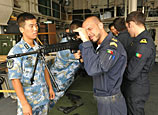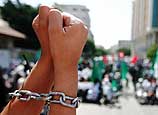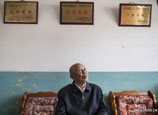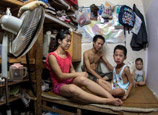
YANGON, July 16 (Xinhua) -- The Myanmar government brought four armed groups to the negotiation table in the first half of this year and the peace process is in progress.
The four armed groups which the government was making deals are Kachin Independence Organization (KIO), the Restoration Council of Shan State (RCSS)'s Shan State Army (SSA)-South, Shan State Progressive Party (SSPP)'s Shan State Army (SSA)-North and Kayinni National Progressive Party (KNPP).
The significant talks between the government's Central Peace Making Work Committee and the KIO, held domestically for the first time in northernmost Kachin state's capital of Myitgyina in May, produced a seven-point agreement covering holding of political talks, de-escalation of cessation of hostilities, formation of a joint monitoring committee, resettlement of internally displaced people, continued discussion on repositioning of troops, stationing of KIO technical team in Myitgyina in the course of the peace process and holding of next political talks.
Under the agreement, the two sides have started work since then on bringing Kachin internal displaced people back home from relief camps.
The two sides are consulting on how to fulfill best the security, economy, education, health and social requirements in undertaking reconstruction.
Obviously, the Myitgyina talks has paved way for next political talks in the future between the government and the KIO which is likely to cover KIO's demand for self-administration.
In June, the government and the RCSS/SSA-South resumed peace talks in Nay Pyi Taw, more than a year after they met in Kengtung, eastern Shan state in May 2012.
It was also signified that prior to the formal talks, Myanmar President U Thein Sein met with peace negotiation leader of the RCSS/SSA-South Lieutenant-General Ywet Sit for the first time for preliminary talks.
U Thein Sein said "all the citizens want to see the end of over six-decade-long armed conflict between national brethren," stressing that "the sole solution is to come to the negotiation table to end the armed conflict that is so far too complex to be resolved with arms."
He affirmed the government's commitment to assisting in deployment of troops, rehabilitation, creation of jobs, food supplies and education and healthcare to RCSS/SSA-South for peaceful future, hoping that all the peace negotiation groups could sign total ceasefire with the government in Nay Phi Taw.
He said that after the deal, proposal to amend the constitution and organize political dialogues will be put forward to the parliament.
Ywet Sit described the president's commitment as an " encouraging sign for peace," expressing his willingness to cooperate with him to make the peace endeavors a success.
Insisting on the fact that fighting with arms is not to secede from the union but just to obtain self-administration, Ywet Sit called for dispelling mutual suspicion and building mutual trust to build conditions for peace which he believed could be achieved through dialogue as the government has opened the political door.
The formal talks after the meeting focused on designation for location of each force of both sides, formation of monitoring groups, running businesses such as agriculture and livestock breeding in line with the law, opening of liaison offices, resettlement of internal displaced persons and issuance of citizenship scrutiny cards.
As for the peace negotiation with SSPP's SSA-North, the Myanmar government urged the armed group in July to prepare for moving to a political dialogue at a future date as a follow-up of their latest talks.
That talks focused on cementing the already established peace and stability and trust between the two sides.
The government side said measures have been introduced for ensuring improvement in education and healthcare sectors of the Wamheng region, reclamation of farmland to create job opportunities, smooth and secured transport for regional development and electrification process.
The talks with the KNPP in Loikaw, capital of Kayah state, in June produced an eight-point agreement, in which the two parties vowed to push ahead with a nationwide ceasefire accord and continue efforts for all-inclusive political dialogue.
The two sides agreed to continue discussions on military affairs in the next rounds of talks and to form a joint monitoring committee.
Under President U Thein Sein's peace offer to internal armed groups in August 2011, peace making has been carried out in three phases -- the first phase is to cease fire, set up liaison offices and travel without holding arms to each other's territory; the second phase is confidence building, holding political dialogue, implementing regional development tasks in terms of education, health and communication; and the third phase is to sign agreement for eternal peace in the presence of parliament represented by nationalities, political parties and different walks of life.
The government claimed that so far, 10 out of 11 ethnic armed groups have signed preliminary peace pacts with the governments at state or central levels since President U Thein Sein announced the peace offer with ethnic armed groups in August 2011.
















 College student car models show youthful vigor
College student car models show youthful vigor


![]()
